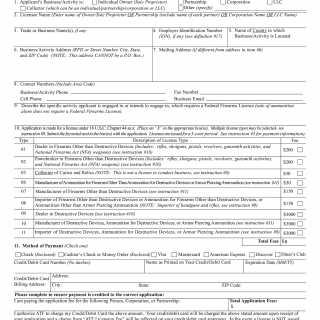ATF Form 7/ 7 CR - Application for Federal Firearms License (ATF Form 5310.12/5310.16)
The ATF Form 7/7CR, also known as the Application for Federal Firearms License, is a form used by individuals and businesses in the United States who want to obtain a Federal Firearms License (FFL). The main purpose of the form is to gather information about the applicant and their business to ensure that they meet the legal requirements for obtaining an FFL.
The ATF Form 7/7CR consists of two parts: Part 1 and Part 2. Part 1 is the actual application for the FFL, and Part 2 is the Responsible Person Questionnaire Supplement (RPQS). The RPQS is required for each responsible person associated with the FFL applicant or holder. The responsible person is defined as any individual who has the power to direct the management, policies, and practices of the FFL applicant or holder.
Important fields on the ATF Form 7/7CR include personal and business information, citizenship status, employment history, criminal history, and information about the location where firearms will be sold or manufactured. The form also requires the applicant to provide information about any firearms-related convictions, restraining orders, or mental health issues.
To complete the form, applicants will need to provide personal and business information, as well as information about any responsible persons associated with the FFL applicant or holder. The applicant will also need to provide additional documents, such as fingerprints and a photograph, and pay a fee for the application.
Examples of practice and use cases for the ATF Form 7/7CR include individuals and businesses who want to sell firearms or ammunition, manufacture firearms or ammunition, or import firearms or ammunition. The form is important to ensure that only responsible individuals and businesses are able to obtain and maintain an FFL.
Strengths of the ATF Form 7/7CR include its thoroughness and ability to gather important information about the applicant and their business. Weaknesses may include the length of time it takes to complete the application process and the associated fees. Opportunities may include the ability to streamline the application process and reduce fees for applicants. Threats may include changes in firearms laws and regulations that could impact the FFL application process.
Alternative forms or analogues to the ATF Form 7/7CR include the ATF Form 1, which is used for individuals who want to manufacture firearms for personal use, and the ATF Form 4, which is used for individuals who want to transfer or register a firearm. The main differences between these forms are the type of activity being conducted and the specific information required.
Once completed, the ATF Form 7/7CR is submitted to the Bureau of Alcohol, Tobacco, Firearms, and Explosives (ATF) for review. The form is stored electronically and is subject to verification by the ATF. The form affects the future of the participants by allowing them to legally engage in the business of selling, manufacturing, or importing firearms and ammunition.

